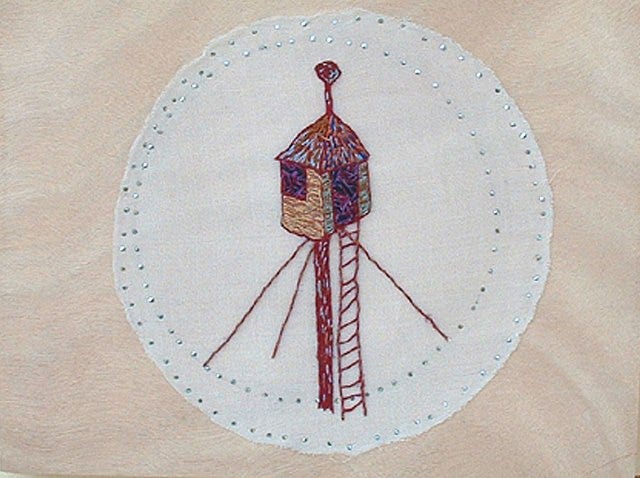Sunday Lectionary: Habakkuk the Watchman
Habakkuk is an odd book in many ways, and doesn’t appear in the lectionary very often so this Sunday is a great opportunity to dig into it. The portion of the text given to us is his first oracle which begins with a complaint against God. Habakkuk describes himself as standing at his ‘watchpost’ - what does this watchful prophet have to teach us about faith? Read on to find out…
Avital Efrat, Noam Rabinovich. Nirim Towers - Watch Tower 2002 Wood, mesh, nails and embroidery thread
Context
Habakkuk is something of a puzzle to scholars because the text tells us very little about when and why it might have been written. Lots of other prophetic books locate themselves historically by the things they make reference to. For example, Babylon is named several times in Ezekiel 17 which helps us to know that it is an exilic text, and Hosea names Assyria in 8:9 which helps us to date the book to the period of the Assyrian deportations and locate it in the northern kingdom of Israel.
There is nothing like that in Habakkuk, which means that scholars are largely at a loss as to where to put it. The closest thing to a consensus is that Habakkuk was a cultic prophet based in the temple, which means that he was active in Jerusalem before the exile. As Martin Sweeny puts it ‘Visionary activity’ like that which we find in the text of Habakkuk, ‘is an important component of temple-based oracular prophecy’ and so he fits in well with other temple prophets. Further to this, there is a lot of what Sweeny calls ‘liturgical language’ in the book, including the language of complaint Psalms in Hab 1:2-4, which further supports the idea that Habakkuk might have been a temple prophet.1
Content
The portion of the text selected by the lectionary is 1.1–4 and 2.1–4. These texts are extracts from the first oracle in the book. One of the most interesting features of this portion of the text is the term ‘watchpost’.
The word מִשְׁמֶרֶת (mishmeret) translated ‘watchpost’ in Hab 2:1 and also in Isa 21:8 is a fairly common word in the Hebrew Bible
It occurs 78 times and is usually used in a context referring to the act of watching, safeguarding, keeping or fulfilling promises. It is also the term used for observing priestly obligations in the temple, hence the perspective that Habakkuk was a temple prophet.
So, this word has a deeper meaning than simply looking or seeing. There is a sense of duty and commitment bound up in it. In relation to prophetic ministry, then, the writer(s) of Habakkuk were pointing out the way in which carefully watching the world around them was key to the life of a prophet.
Habakkuk and Luke
In Luke 17:5 Jesus says that if you have faith the size of a mustard seed then you can ask God to do great, and perhaps even impossible, things. How does this relate to Habakkuk’s oracle?
The figure of the watchman is key. We need to be attentive to the world around us in order to know how to pray boldly. What are the challenges and struggles in our communities today? How are we led to pray for them, boldly and in faith? May Habakkuk’s faithful watching be an encouragement to the church today.
Sweeny, M.,. The Twelve Prophets: Micah, Nahum, Habakkuk, Zephaniah, Haggai, Zechariah, Malachi (Collegeville, Liturgical Press, 2000), p 456




